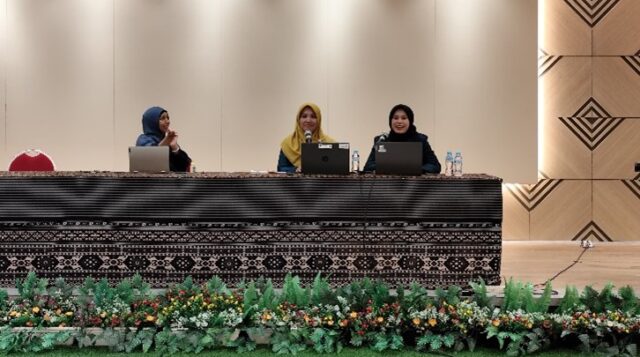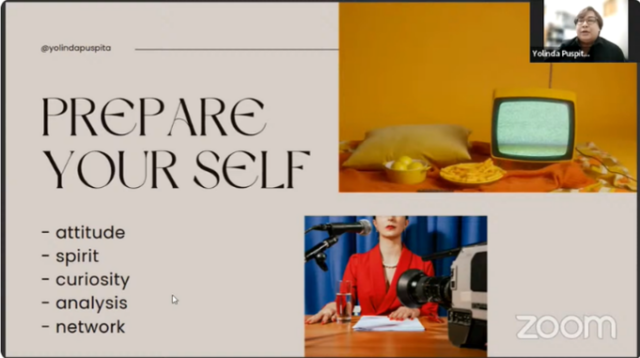Anandia Novirika’s melodious voice echoed throughout the hall at the Faculty of Cultural Studies (FCS), Universitas Brawijaya (UB). As a seasoned radio announcer with years of broadcasting experience, her confidence and expertise in engaging with students were undeniable. Both students and lecturers, attending either in person or online, listened attentively to her insights.
FCS UB invited Ananda Novirika, a senior radio announcer from Radio Republik Indonesia (RRI) Malang, to share her knowledge and experience as a radio host in the Teaching Factory. In addition to Ananda, FCS UB also invited Yolinda Puspita Rini, a television programme producer at Trans7, and Dr Harfiyah Widiawati, a researcher and member of the National Research and Innovation Agency (BRIN). This event was held on Thursday, 20th June 2024.
“Who listens to the radio nowadays? Actually, there are still many segments of society who faithfully tune in. Why? There is an intimate interaction with the host that cannot be replicated by other media. The host can also create the desired atmosphere, providing listeners with a complete audio entertainment experience,” said Ananda, known affectionately as Nana.
She passionately explained how to become a skilled radio announcer. The first point she emphasised was the need for a unique vocal character. A radio announcer must have a voice that is easily recognisable by listeners. Additionally, they must be knowledgeable, able to build an interesting and informative narrative for listeners, and introduce various programmes effectively. Proficiency in English also supports a radio announcer in accessing, understanding, and communicating international information and content.
“Last but not least, a radio announcer must be friendly and sociable. Often, a radio announcer has to interview guest stars. Once, I had to interview Ahmad Dhani at RRI Malang without proper preparation. It was the habit of making small talk that broke the ice and made the guest star more open to answering questions,” said Nana.
“Even if there is no guest star, the lack of social interaction will be evident in the broadcast, making it more rigid compared to those who enjoy socialising,” she added.
She shared vocal techniques she learned during her career, focusing on how to produce a voice with clear articulation that is pleasing to the ear.
This session felt incomplete without practising the material presented. Farsya Aisyah, a student from the English Literature Study Programme, ventured to practise the opening of a UB Radio broadcast. Nana praised Farsya’s attempt, considering it commendable for a beginner. She also encouraged all participants to practise technical skills regularly and increase interaction with others to improve communication abilities.
The second session was delivered online by Yolinda Puspita Rini, an experienced producer involved in various national television programmes at Trans7. Her relaxed and engaging demeanour made the material easy to digest. Yolinda explained that there are five crucial attributes for a career in the television industry: attitude, spirit, curiosity, analytical ability, and networking.
“In the world of television, there is no ‘I’, it’s always ‘we’. Producing a television programme ready for broadcast involves many people, all equally important. Therefore, the mentality in this industry is to work as a team,” she explained.
She also shared her experiences in overcoming workplace challenges and finding solutions in various situations.
“If you want to grow in the industry or prepare yourself for work, especially in the media, you must start being active. Passivity will not lead to achievement. This active culture, or the courage to speak up, can be developed in college right now by being active in class or contributing ideas in organisations,” Yolinda advised the participants.
The third session of the Teaching Factory was led by Dr Harfiyah Widiawati from BRIN, who presented online. Dr Harfiyah, an experienced researcher with a background in literature, brought a deep academic perspective to the session. She discussed the importance of research and innovation in media and cultural development, providing valuable insights for the students and lecturers present.
The Teaching Factory activity organised by FCS UB succeeded in offering comprehensive and in-depth insights to the attendees. With speakers from various fields, including a radio announcer, television producer, and researcher from BRIN, participants gained a broader understanding of the media industry and the significance of research and innovation. This event not only inspired students to pursue careers in broadcasting but also taught them important values such as teamwork, proactiveness, and the courage to speak up. [trans.acl/ed.al/vidya/PR FCS]


